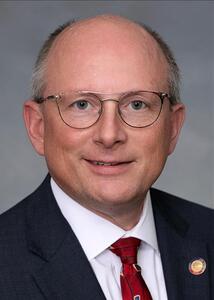Introduction
As lawmakers negotiated to develop a state budget that would usher in Medicaid expansion and provide significant funding for mental and behavioral health in North Carolina, among other expenditures, Representatives Carla Cunningham and Dr. Timothy Reeder spoke about their legislative priorities with North Carolina Medical Journal Editor-in- Chief Dr. Peter J. Morris.
In the conversation, Cunningham, an experienced licensed registered nurse who has been a member of the North Carolina General Assembly since 2013, championed institutional collaboration to address upstream issues that lead to poor health outcomes. Reeder, an emergency physician in Pitt County and full-time faculty at East Carolina University who joined the North Carolina General Assembly in 2023, emphasized the need for evidence-based data and accountability measures to ensure the programs that exist to support families and children in the state are effective and determine how to move forward.
Both members, who serve together on the House Appropriations on Health Committee, noted the value of bipartisanship in working on health issues and the benefits of having members of the health care community in the legislature.
“If you listen to the national press, it’s all divisive, but that’s not my experience on the state level,” said Reeder. “Especially related to health issues, there are some controversial ones, but on many of the issues everyone votes ‘yea,’ because they’re irrefutable.”
Dr. Peter J. Morris: What is the temperature on child health and well-being in the 2023–2024 General Assembly session?
Rep. Carla Cunningham: In the behavioral and mental health space, we all know that for a long, long time we have not invested significantly enough to decrease our suicide rates in the adolescent-to-24-year-old age group, and to address some of the adverse childhood experiences and early childhood trauma. And of course, since COVID happened, we’ve seen those issues escalate. And when those issues exist, whether it is substance abuse or behavioral health, they usually go hand in hand and with other problems and the family needs a lot of support to be able to stay on top of the care that has to be provided to their children. I would say the mental and behavioral health investment is going to be quite significant for us.
Rep. Tim Reeder: I think everybody on both sides of the aisle recognizes that we’re in a big mental health crisis right now, in particular for children and adolescents. We had a big issue prior to COVID, and COVID has accelerated the number of patients suffering and has shown how our health system is just really not functioning very well right now. Where I struggle is trying to figure out the solution. I’m not sure right now that there is a plan that is integrated across the systems and institutions. When North Carolina made the decision many years ago to go to mental health managed care, we somehow forgot that the head was connected to the body, and I think that we need to be getting back to thinking about how they’re integrated. I’m looking for ways we can do that, and there needs to be evaluation and assessment of the programs as we fund them.
Morris: You mention the increasing presentation of depression, anxiety, or ADHD. How is that showing up in your practice and communities?
Reeder: Whether the system is more broken or dysfunctional or society is more dysfunctional, we have more people with mental health concerns in our emergency department than ever before and they’re staying longer. We just had a child leave our emergency department [in Pitt County]. He spent over 140 days with us, so he was living in the department, and that’s just unconscionable. He has some mental illness, but the big driver for him is the ACEs, the adverse childhood events. He had been in foster care for a number of years in a different county that has almost no resources for congregate living like a group home. So, unfortunately for this youngster, we ended up sending him farther away, across the state.
I just know that every day these children are in the emergency department, that is just another childhood trauma that we’re piling on. We try to be open and welcoming, but unfortunately, I know now how to get schoolwork for children, and we give them haircuts. When I went to emergency medicine school, none of that was part of the curriculum, but that’s what we’re seeing more and more. The cases are more difficult and challenging and the system is struggling.
Cunningham: I think it’s cumulative. I think with an ounce of prevention you see a pound of cure, but in most cases with behavioral and mental health and substance use, there’s not a cure. There’s ongoing required treatment throughout life.
I think the prevalence of anxiety and depression in children has significantly increased, and it’s not just because of COVID. There is a lack of social skills and soft skills that are required in order to maintain your behavior at what’s appropriate, probably because of advanced technology. The system has been broken but it’s going to take a lot of investment and collaboration, and we’re going to have to really do evidence-based care and look at the outcomes.
I think also that the stigma is still very prevalent for behavioral and mental health services and substance use services. That plays a large role in trying to get help, especially in my community of people of color.
Reeder: We are looking at a health care solution to a cultural, societal problem. I believe that the family structure is the foundation of a functioning society and for whatever reason we’ve seen over the last decades that the family unit is falling apart. When we look for a legislative or a health care fix, I fear that we’re going to miss the mark. How do we support families so that they can have children, get them educated, have a job, and provide for them? That’s where I think we need to be looking as opposed to just putting more money into the mental health system.
Morris: What are some legislative efforts that that are addressed more toward supporting parents or families?
Cunningham: Child care is something that we really are going to have to take a hard, hard look at. If you can get your child into early childhood education before they go to pre-K, they learn and they’re better able to emotionally and behaviorally control themselves. We want those people that are going to provide those services to be well educated and know what to do in emergency situations when the child becomes ill, as well. But we haven’t incentivized those individuals to stay in that field.
It has become so expensive to provide child care, especially for infants. I know here in Mecklenburg County, you’re going to run $800 to $1000 a month to provide quality child care for a small infant. That is going to be a huge issue as we move forward if we want to keep our economy going and keep food in the children’s mouths, a roof over their head, and them clothed and going to school and being successful.
Reeder: I go back to some of the social drivers for where we are. We see in our children’s emergency department every day, 14-, 15-, 16-year-olds who are pregnant who are coming from families that are broken. We know from the data that when you’re a 15-year-old who’s having a baby, the likelihood of that child being what we consider successful is really hard.
In our area, most of the high-risk obstetrics is done through the university. I learned from one of our OBs that there’s just a lack of access. They were telling us that 0% of their pregnant women were seen in the first trimester. Zero. That is not a long-term success. We know that the health of the baby, the health of the mother is better when the pregnancy is planned than when it’s not. So, I think we need to be thinking about how to make pregnancies planned when it’s appropriate and both parents are ready to welcome that child into the world. And we need to make North Carolina a good place to be born.
Cunningham: I want to add something about pregnancy and childbirth, especially for women of color. Some of us are married, some of us are very well educated, some of us are very financially set, and we still have high maternity mortality, as well as infant mortality. I cannot say enough about doing prenatal care, but there is a huge gap in how to communicate with people of different races and ethnicities among nurses, doctors, and anyone within the health care arena that is providing care. That has been true for a long, long time, and I think we’re in a transition of trying to embrace cultural competence.
It’s also important to consider how to you really include the family, because when the person walks out of the hospital or back into their home environment, they go back to their culture, to their family, and it’s connected to the outcomes that are produced.
Reeder: Amen.
Morris: Do you find that you get a welcome ear from your colleagues in the General Assembly when you speak about health in this way?
Cunningham: I had worked for over 35 years in numerous fields and I came originally from hospice when I came into the General Assembly. When I first got there, my focus was mental health and suicide prevention, mostly because I have a personal experience with it, so my colleagues do listen and we do talk and collaborate. Even though we may come from a different space of how we get there, we are able to talk with one another.
People that are in the medical field or one that is connected to medical or health care or providing services to individuals, we think differently. We’ve always had to work as a team and so it’s not unfamiliar for us to come in and try to be collaborative to get to some of the goals we want to meet. One of the most important things as a legislator is knowing how to engage with individuals that come from a different walk of life, that may have a different perspective on a particular issue.
Reeder: Yes, our experiences shape our worldview. When people talk about things like Medicaid and prescription prices in the abstract, Representative Cunningham and I, we can see the patient who’s in front of us who can’t afford the medicine or is struggling.
One of the things I’ve appreciated is that our General Assembly is meant to be a citizen legislature, so we have people who have broad experiences, and you have to rely on them. I’m a freshman and I’ve only been up there for a few months, but I’m hopeful that people will listen to me about health. Agriculture is the biggest industry in Pitt County, and I know that you plant seeds in the ground, things grow, you cut them down and sell them; that’s what I know about agriculture, so I have to look to people like Jennifer Balkom [R—117] and Jimmy Dixon [R—4] to say, ‘Help me understand what this means’. In much the same way, they come to me and say, ‘Help me understand funding an LME/MCO differently’.
There are clearly controversial issues where there’s a divide. But most of the things that we do are unanimous and bipartisan, and health very much falls into that. We might argue about how much money and where to spend, but the core principles, there’s a lot of agreement on that.




